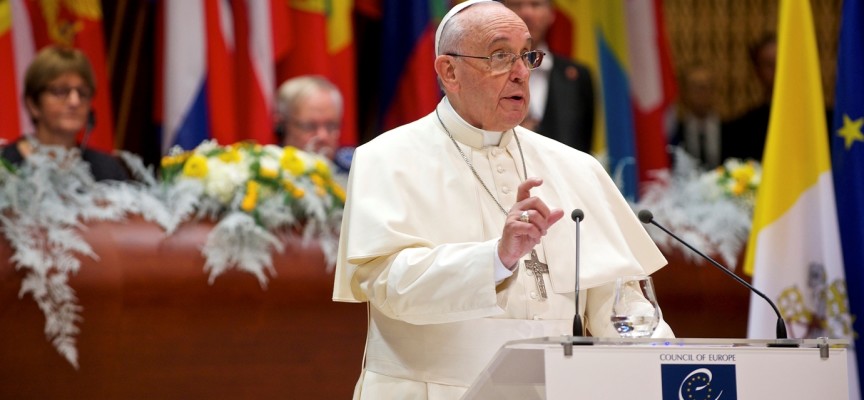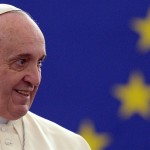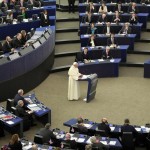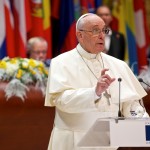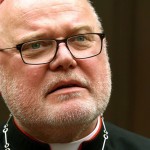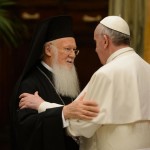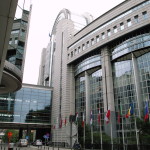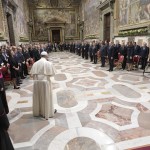The 2016 Charlemagne Prize has been awarded to Pope Francis. Interviewed by a group of French Catholics, he gives his private views on his vision of Europe Europe
Every year, the German city of Aachen awards the International Charlemagne Prize for an outstanding contribution to European unification. Pope Francis has been chosen, for his “message of hope and encouragement” to Europeans. He will receive the prize in Rome on 6 May.
The keynote address that Pope Francis delivered to the European Parliament on 25 November 2014 had created a deep impression on the Members of the European Parliament and other observers. More recently, during a press interview, the Pope revealed that he liked the idea of a “re-foundation” of Europe. “We must do everything so that the European Union has the strength and also the inspiration to make it go forward.”
In a friendlier, more intimate setting, we had the opportunity to be received by Pope Francis on 1 March last together with around thirty Catholics drawn from a wide range of those involved in Catholic social action in France. During this lengthy discussion, we were able to ask him about his vision of Europe.
Private thoughts on his vision of Europe
“Since the time of Magellan,” Pope Francis remarked with a twinkle in his eye, Europe has been observed from afar, from the Southern hemisphere, from a periphery, a remoteness allowing room for analysis. Hearing him say, “I understand my faith better from the periphery,” teaches us that remoteness does not create aloofness. This is the vision which brings perspective and raises warning signals, a reminder of one’s duties. That is when we realised that our discussion was not merely a courteous reply to a question from the audience but an opportunity seized by Pope Francis to share his findings, his critical vision, and to suggest a way forward to an audience of committed Christians, including the French political movement Les Poissons Roses, the French think tank Esprit Civique, three national parliament members, several local officials, and representatives of voluntary bodies linked to Social Christianity such as Jérôme Vignon, President of the Semaines Sociales de France.
We brought up some names of ‘personalist’ authors whose ideas connect us together and the Pope stopped us on the name of Emmanuel Levinas. Was this a paradoxical reference for a Pope, or rather a career for Europeans to reflect upon? Born in Lithuania, emigrating first to the Ukraine, then to Strasbourg, to Fribourg and finally to Paris, this French philosopher, brought up on the Talmud, Russian literature and German phenomenology had also regularly visited Gabriel Marcel. His was a dramatic voyage right across the European continent, and represented a fabulous combination of European cultures and thinking. When the Pope reminded us that loyalty to our roots had prompted the welcome of this deportee, the ethical rule proposed by Levinas became clear: in order to have a house that welcomes the other, you have to know how to meditate there, live in it and then open its doors.
A Europe that is truly open
Pope Francis did not mince his words: the arrival of migrants in distress is a social reality that Europe must take into account. Europe used to be open to the world, both in receiving and in giving. Today Europe must remain capable of enlarging itself in the exchange with other cultures. This Europe will respect the angles which indicate the differences in trajectories, history and heritage. Our continent cannot boast of being the most cultured, as that claim could be disputed by China, but what it does have that is unique is the quest for unity in diversity; the world needs this model, the opposite of trivialisation in a global setting focussed upon the interests of the individual.
Grasping hold of this necessary tension between the heterogeneity of cultures and the search for unity presupposes that one is going beyond the dimensions of a physical area and looking rather at the dimension of time. The scale of a human life has been proposed. The European community, to which he jokingly referred to as “abuela” (grandmother), has grown old and is no longer bearing enough fruit: in order to integrate others it is vital to find back the energetic force that will support change and integration. This will put her back on track, despite terrorism and the war – yes, Francis did indeed use this horrific word – which fuels inequality and all forms of trafficking, beginning with the trafficking of arms.
It seemed to me that his reference to Europe’s founding fathers should not be taken as nostalgia for a past era when Europe gained a personality. It rather revealed part of the thought processes of a man who has reminded us of what had been possible and states the seriousness of the current situation, the urgent need for a European political intervention. What remains is to put the battle of ideas at the service of the poorest, both economically through republican brotherhood and spiritually through Mercy. Having said that, the answer should also reveal action not words, as was shown by Pope Francis’ visit to Lesbos.
(source: Europeinfos #193)
Il Premio Carlo Magno 2016 è stato assegnato a papa Francesco. Intervistato da un gruppo di cattolici francesi, ha raccontato i suoi pensieri riguardo l’Europa.
Ogni anno, con il Premio Internazionale Carlo Magno, la città tedesca di Aquisgrana offre un riconoscimento a un contributo eccezionale per l’unificazione europea. Papa Francesco è stato scelto per il suo “messaggio di speranza e d’incoraggiamento” agli europei. Il premio gli sarà consegnato a Roma il 6 maggio.
Il discorso che papa Francesco ha tenuto al Parlamento europeo il 25 novembre 2014, ha segnato i deputati e osservatori. Più di recente, il Papa aveva confidato in un’intervista la sua propensione per l’idea di una rifondazione dell’Europa. “Dobbiamo fare tutto il possibile perché l’Unione europea trovi la forza, ma anche l’ispirazione per andare avanti”.
In un clima più riservato e amichevole, abbiamo avuto la fortuna di essere accolti da papa Francesco il 1° marzo scorso, con una trentina di cattolici in rappresentanza, nella sua diversità, del cattolicesimo sociale francese. Durante questa lunga conversazione abbiamo avuto l’occasione di potergli porre alcune domande circa la sua visione dell’Europa.
Confidenze sulla sua visione dell’Europa
“A partire da Magellano”, ci ha ricordato Papa Francesco con un sorriso divertito, si guarda l’Europa da lontano, dal Sud, da una periferia, distanza che permette l’analisi. Sentirgli poi dire: “Capisco meglio la mia fede dalla periferia”, mostra che la distanza non crea affatto indifferenza. È la visione che porta al discernimento e permette di restare vigili, richiama ai propri doveri. È emerso poi che la nostra conversazione non era una risposta cortese a una richiesta di udienza. È stata un’opportunità che Francesco ha colto per condividere un’analisi, una visione critica e proporre un cammino a dei cristiani impegnati, tra cui una corrente politica, i Poissons roses, un think tank, Esprit Civique, tre parlamentari, due rappresentanti politici locali, dei membri di associazioni legate al cristianesimo sociale, come Jérôme Vignon, presidente delle Settimane sociali di Francia.
Abbiamo ricordato gli autori personalisti che ci legano e il Papa si è soffermato su Emmanuel Levinas. Riferimento paradossale per un Papa? O piuttosto percorso da meditare da parte degli europei? Nato in Lituania, emigrato in Ucraina, poi a Strasburgo, a Friburgo e a Parigi, questo filosofo francese, nutrito dal Talmud, dalla letteratura russa, dalla fenomenologia tedesca ha anche frequentato Gabriel Marcel. Percorso drammatico attraverso l’Europa, nella sua massima lunghezza, e meravigliosa integrazione di culture e pensieri europei. Quando il Papa ci ha ricordato che l’accoglienza dell’escluso è fedeltà alle nostre radici, l’etica proposta da Lévinas ha preso carne: per avere una casa accogliente per l’altro bisogna sapersi incontrare lì dentro, abitarla e quindi aprirne le porte.
Un’Europa aperta
Francesco è stato preciso: l’arrivo di immigrati in difficoltà è un dato sociale che l’Europa deve prendere in considerazione. Essa si è aperta al mondo, perché ha ricevuto ciò che ha trasmesso. Oggi deve restare in grado di espandersi nello scambio con le altre culture. Questa Europa rispetterà gli angoli che segnano la differenza delle traiettorie, delle storie, dei patrimoni. L’Europa non può rivendicare di possedere la cultura più alta, la Cina potrebbe contestarcelo, ma ciò che ha di unico è la ricerca di unità nella diversità, e il mondo ha bisogno di questo modello, il contrario della banalizzazione di una globalizzazione centrata sull’interesse individuale.
Imparare questa tensione necessaria tra la eterogeneità delle culture e la ricerca di una unità implica il superamento di una lettura geografica e di pensare nel tempo . La scala di una vita ci è stata proposta. La matrice europea, che egli ha chiamato con una parola più affettuosa che rispettosa, “abuela”, nonna, è invecchiata e non da più abbastanza frutti: per integrare gli altri, bisogna ritrovare il dinamismo che porterà le trasformazioni, le integrazioni. Una ripresa del cammino nonostante il terrorismo e la guerra – e Francesco ha usato questa parola terribile – che alimenta la disuguaglianza, e tutte le forme di traffico, a partire dal traffico d’armi.
Mi è parso che il suo riferimento ai padri fondatori non fosse da intendersi come il rimpianto di un’epoca passata in cui l’Europa è stata personalizzata. È un elemento della riflessione di un uomo che ci ha ricordato ciò che è stato possibile e dice la gravità del momento, l’urgenza di una invenzione politica europea. Ancora bisognerà porre la battaglia delle idee al servizio dei poveri, economicamente con la fraternità repubblicana, e spiritualmente con la Misericordia. Ma la risposta è anche mettersi in azione, come indica la visita di Francesco a Lesbo.
(fonte: Europeinfos #193; traduzione italiana a cura di Eurcom)
L’Europe du Pape François
Le prix européen Charlemagne 2016 a été attribué au pape François. Confidences sur sa vision de l’Europe, recueillies par un groupe de catholiques français.
Le Prix international Charlemagne, décerné par la ville allemande d’Aix-la-Chapelle, récompense tous les ans une contribution exceptionnelle à l’unification européenne. Le Pape François a été choisi, pour son « message d’espoir et d’encouragement » aux Européens. Il lui sera remis à Rome à le 6 mai.
Le discours-phare du Pape François au Parlement européen le 25 novembre 2014, avait marqué les esprits des députés européens et des observateurs. Plus récemment, le Pape avait confié dans un entretien avec des journalistes aimer l’idée d’une refondation de l’Europe. « Nous devons faire tout ce qui est possible pour que l’Union européenne trouve la force mais aussi l’inspiration d’aller de l’avant ».
De façon plus confidentielle et amicale, nous avons eu la chance d’être accueillis par le Pape François le 1er mars dernier, avec une trentaine de catholiques représentant, dans sa diversité, le catholicisme social français. Lors de ce très long entretien nous avons pu l’interroger sur sa vision de l’Europe.
Confidences sur sa vision de l’Europe
« Depuis Magellan » nous a rappelé le Pape François avec un sourire amusé, on regarde l’Europe de loin, du Sud, d’une périphérie, distance qui permet l’analyse. L’entendre dire ensuite « Je comprends mieux ma foi depuis la périphérie », montre que la distance ne crée aucune indifférence. C’est la vision qui porte le discernement et permet la mise en garde, le rappel des devoirs. Il apparut alors que notre entretien n’était pas une réponse courtoise à une demande d’audience. C’était l’occasion que François avait saisie pour partager un constat, une vision critique, et proposer un chemin à des chrétiens engagés dont un courant politique, les Poissons Roses, un laboratoire de pensée, Esprit civique, trois parlementaires, des élus locaux, des militants associatifs liés au Christianisme Social, comme Jérôme Vignon, Président des Semaines Sociales de France.
Nous avons rappelé les auteurs personnalistes qui nous lient et le Pape s’est arrêté sur Emmanuel Levinas. Référence paradoxale pour un Pape ? Ou plutôt parcours à méditer par les européens. Né en Lituanie, émigré en Ukraine, puis à Strasbourg, à Fribourg et à Paris, ce philosophe français, nourri par le Talmud, la littérature russe, la phénoménologie allemande a aussi fréquenté Gabriel Marcel. Parcours dramatique à travers l’Europe, dans sa plus grande longueur, et fabuleuse intégration de cultures et de pensées européennes. Quand le Pape nous a rappelé que l’accueil de l’exclu était fidélité à nos racines, l’éthique proposée par Levinas prenait chair: pour avoir une maison accueillante à l’autre il faut savoir s’y recueillir, y demeurer, et ouvrir ensuite sa porte.
Une Europe ouverte
François a été précis : l’arrivée d’immigrés en détresse est une donnée sociale que l’Europe doit prendre en compte : elle a été ouverte au monde, par ce qu’elle a reçu et ce qu’elle a transmis. Aujourd’hui elle doit rester capable de s’agrandir dans l’échange avec d’autres cultures. Cette Europe respectera les angles qui marquent la différence des trajectoires, des Histoires, des patrimoines. L’Europe ne peut se targuer de détenir la plus haute culture, la Chine pourrait nous le disputer, mais ce qu’elle a d’unique c’est la quête de l’unité dans la diversité, et le monde a besoin de ce modèle, le contraire de la banalisation dans une globalisation centrée sur l’intérêt individuel.
Appréhender cette nécessaire tension entre l’hétérogénéité des cultures et la recherche d’une unité suppose de dépasser une lecture géographique, et de penser dans le temps. L’échelle d’une vie nous a été proposée. La matrice européenne, qu’il a appelée d’un mot plus affectueux que respectueux « abuela», grand-mère, a vieilli et ne donne plus assez de fruits : pour intégrer les autres il faut retrouver le dynamisme qui portera les mutations, les intégrations. Une remise en route malgré le terrorisme et la guerre – et François a employé ce mot terrible – celle que nourrit l’inégalité, et tous les trafics, à commencer par les trafics d’armes.
Il m’a semblé que sa référence aux pères fondateurs ne devait pas être comprise comme le regret d’une époque révolue où l’Europe fut personnalisée. C’était un élément de la réflexion d’un homme qui nous a rappelé ce qui fut possible et dit la gravité du moment, l’urgence d’une invention politique européenne. Encore faudrait-il mettre le combat d’idées au service des plus pauvres, économiquement par la fraternité républicaine, et spirituellement par la Miséricorde. Mais la réponse soit aussi se faire en action comme le montre la visite de François à Lesbos.
(source: Europeinfos #193)
Das Europa von Papst Franziskus
Papst Franziskus wird am 6. Mai in Rom der Internationale Karlspreis 2016 verliehen. In einem Gespräch mit einer Gruppe französischer Katholiken gibt das Kirchenoberhaupt Einblicke in seine Vision von Europa.
Mit dem Internationalen Karlspreis zu Aachen werden jedes Jahr besondere Beiträge zur europäischen Einigung gewürdigt. Papst Franziskus wurde aufgrund seiner „Botschaft der Hoffnung und der Ermutigung“ an die Menschen in Europa ausgewählt. Die offizielle Verleihung des Preises findet am 6. Mai in Rom statt.
Die Ansprache von Papst Franziskus vor dem Europäischen Parlament am 25. November 2014 hat bei den Abgeordneten und Beobachtern bleibenden Eindruck hinterlassen. Unlängst erklärte Papst Franziskus in einem Gespräch mit Journalisten, er möge die Idee der Neubegründung der Europäischen Union. „Wir müssen alles tun, damit die Europäische Union die Kraft und die Inspiration hat, weiter voranzukommen.“
Am 1. März empfing der Papst eine Gruppe von rund 30 Vertretern aus den unterschiedlichsten Bereichen des französischen sozialen Katholizismus zu einem vertraulichen und freundschaftlichen Gespräch. Im Rahmen dieser sehr langen Unterredung beantwortete er Fragen zu seiner Sicht von Europa.
Persönliche Sichtweise von Europa
„Seit Magellan“, so erinnerte der Papst mit einem amüsierten Lächeln, schaut man aus der Ferne auf Europa, vom Süden her, von der Peripherie aus, aus einer Distanz, die eine Analyse möglich macht. Wenn man ihn dann sagen hört: „Ich verstehe meinen Glauben besser von der Peripherie aus“, zeigt dies, dass Distanz keineswegs Gleichgültigkeit schafft. Es ist eine Sichtweise, aus der die Unterscheidung erwächst und die es erlaubt, Mahnungen auszusprechen und auf Pflichten aufmerksam zu machen. Unser Gespräch, so wurde klar, war keine höfliche Antwort auf ein Audienzgesuch. Für Franziskus war es vielmehr Gelegenheit, uns seine kritische Sicht der Dinge darzulegen und einen Weg zu weisen, uns, einer Gruppe engagierter Christen, bestehend aus einer politischen Strömung, der französischen Sozialbewegung Les Poissons Roses (die rosa Fische), einem Thinktank „Esprit civique“ (Bürgersinn), drei Parlamentariern, Lokalpolitikern sowie dem Sozialchristentum verschriebenen Verbandsaktivisten wie Jérôme Vignon, Präsident der katholischen Laienbewegung Semaines Sociales de France.
Im Gespräch kamen wir auf die personalistischen Philosophen zu sprechen, die uns verbinden. Der Papst ging insbesondere auf Emmanuel Levinas ein. Eine paradoxe Referenz für einen Papst? Oder vielmehr ein Weg, der den Europäerinnen und Europäern zu denken geben sollte? Der in Litauen geborene, in die Ukraine emigrierte französische Philosoph lebte später in Straßburg, Freiburg und Paris. Seine Inspiration schöpfte er aus dem Talmud, der russischen Literatur und der deutschen Phänomenologie. Levinas war auch bekannt mit Gabriel Marcel. Er ist einen dramatischen und langen Weg durch Europa gegangen und hat dabei in herausragender Weise europäische Kulturen und Denkweisen integriert. Als der Papst darauf verwies, dass die Aufnahme des Ausgeschlossenen Treue gegenüber unseren Wurzeln bedeute, nahm die Ethik Levinas‘ Gestalt an: Um ein gastfreundliches Haus zu haben, muss man dort selbst innere Einkehr halten und verweilen können, um dann dem anderen die Tür zu öffnen.
Ein offenes Europa
Franziskus wurde konkret: Die Ankunft von Flüchtlingen in Not ist ein soziale Gegebenheit, über die Europa nichthinweggehen kann. Europa war offen gegenüber der Welt durch das, was es erhalten und das, was es vermittelt hat. Heute muss es fähig bleiben, sich im Austausch mit anderen Kulturen zu erweitern. Dieses Europa wird die unterschiedlichen Wege, Geschichten und Kulturen respektieren. Europa kann nicht für sich in Anspruch nehmen, die am höchsten entwickelte Kultur zu haben. China könnte uns diesen Titel streitig machen. Was Europa jedoch einzigartig macht, ist sein Streben nach Einheit in der Vielfalt. Die Welt braucht ein solches Modell, als Gegenstück zur Banalisierung in einer Zeit der Globalisierung, in der das Interesse des Einzelnen im Mittelpunkt steht.
Ein besseres Verständnis dieser notwendigen Spannung zwischen Heterogenität der Kulturen und der Suche nach Einheit setzt voraus, dass wir von einer rein geografischen Lesart abkommen und zeitbezogen denken. Der von Papst Franziskus vorgeschlagene Maßstab ist die Länge eines Lebens. Europa, das der Papst liebevoll, aber nicht respektlos „abuela“, Großmutter, nennt, ist gealtert und nicht mehr sehr fruchtbar: Um die anderen zu integrieren müssen wir zu der Dynamik zurückfinden, die Veränderung und Integration ermöglicht. Sich wieder auf den Weg machen trotz Terror und – Franziskus scheute nicht vor diesem furchtbaren Wort zurück – Krieg, der Ungleichheit und allen Arten von illegalen Machenschaften, angefangen beim Waffenhandel, Vorschub leistet.
Mir schien, sein Bezug auf die Gründerväter sollte nicht als Nachtrauern einer vergangenen Zeit verstanden werden, in der Europa personalistisch war. Vielmehr war es das Denken eines Mannes, der daran erinnert, was möglich war, und der auf den Ernst der Stunde hinweist, auf die Dringlichkeit eines europäischen politischen Sich-Neufindens. Die geistige Auseinandersetzung muss im Dienst der Ärmsten stehen, wirtschaftlich gesehen durch eine Art republikanischer Brüderlichkeit und spirituell gesehen durch die Barmherzigkeit. Die Antwort muss sich aber auch in Taten umsetzen, wie der Besuch von Papst Franziskus auf Lesbos zeigt.
(quelle: Europeinfos #193)
Philippe Segretain
Latest posts by Philippe Segretain (see all)
- Pope Francis’ vision of Europe - 6 maggio 2016

